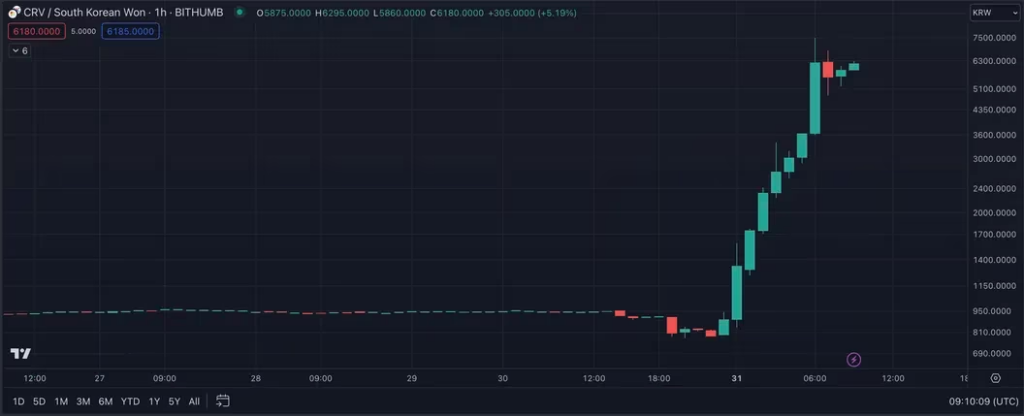Table of Contents
- Following a Significant Exploit, Curve Finance’s Token Experiences a Remarkable 500% Surge on Bithumb
- BALD Token Experiences a 90% Plummet After The Developer Withdraws Liquidity
- Tether Discloses a Surplus of $3.3 Billion in Reserves During Q2, Marking an Increase of $850 Million For The Quarter
- Coinbase Was Instructed by The SEC to Halt Trading in All Cryptocurrencies Except Bitcoin Before Facing Legal Action, According to The FT
- Yuga Labs’ Acquisition of Roar Studios Aims to Propel Their Ambitious Vision for Otherside
Following a Significant Exploit, Curve Finance’s Token Experiences a Remarkable 500% Surge on Bithumb
CRV, the native token of Curve Finance, a decentralized exchange focused on stablecoins, has witnessed a significant surge in trading on the South Korea-based digital assets exchange, Bithumb, after facing a security exploit on Sunday.


Curve Finance, a crucial pillar of the decentralized finance (DeFi) ecosystem, fell prey to a reentrancy attack that put $100 million worth of digital assets at risk.
As a result of this incident, CRV’s price in USD dropped by over 15%, posing a threat of liquidation for a substantial borrowed position on Aave and potentially causing market-wide contagion.
However, the price of CRV denominated in Korean won (KRW) skyrocketed.
At the time of reporting, Bithumb’s CRV/KRW pair was trading at KRW 5,565 ($4.36), marking an impressive 500% increase for the day, as indicated by the charting platform TradingView.
According to Bithumb’s local competitor, Upbit, some of Curve’s stablecoin pools were affected by the reentrancy attack, which explains the fluctuations in CRV’s price.
Upbit took precautionary measures by suspending CRV withdrawals and deposits to ensure the safety of digital asset transactions.
As of now, the CRV/BTC pair on Upbit is trading 55% higher for the day.
Despite the negative optics resulting from the exploit, certain influential figures in the industry remain optimistic about CRV’s long-term prospects.
Jihan Wu, co-founder of Bitman and Matrixport, expressed confidence in CRV’s role in the forthcoming RWA (Real-World Asset) wave and even mentioned buying the dip.
Tron’s Justin Sun also showed support for Curve and those affected by the exploit.
BALD Token Experiences a 90% Plummet After The Developer Withdraws Liquidity
According to data, the recently launched BALD tokens on the Base blockchain suffered a significant decline of up to 90% after reaching their peak on Monday.
This drop occurred when the token’s developer withdrew millions of dollars worth of liquidity.
During the European morning hours on Monday, BALD tokens held an impressive $32 million worth of ether (ETH).
However, the developer’s actions caused the token’s value to plummet from 9 cents to 1 cent.
Fortunately, prices seemed to recover slightly to 4 cents at the time of writing, as some traders took advantage of the dip and made purchases.
The popularity of bald tokens had been on the rise among trading circles, and on Sunday, their market capitalization reached $50 million.
Later that same Sunday, it surged to $85 million, allowing traders like @cheatcoiner to make substantial gains, earning over $1.4 million from an initial investment of $500.
Currently, blockchain data indicates that the token’s developer is gradually adding liquidity in smaller batches of ether, leading to a steady rise in prices.
However, nervous token holders continue to sell their tokens in large quantities.
The Base blockchain, built by Coinbase on the OP Stack, launched its testnet in January and opened to developers in mid-July, based on the submission of applications to Base.
While traction has been limited so far, Sunday’s sudden rush in capital and users to the blockchain was driven, in part, by the popularity of BALD tokens.
Tether Discloses a Surplus of $3.3 Billion in Reserves During Q2, Marking an Increase of $850 Million For The Quarter
According to its Q2 attestation released on Monday, Tether, the issuer of the USDT stablecoin, held a substantial $3.3 billion in reserve assets to back the value of its stablecoins.
The attestation, signed by accounting firm BDO Italy, disclosed that the company had about $72.5 billion in exposure to U.S. Treasuries, including investments in direct T-bills, repurchase agreements, and money market funds.
As of June 30, Tether’s bitcoin (BTC) holdings increased in value to $1.67 billion from $1.5 billion three months earlier, but the actual number of tokens held was not revealed.
The firm reported operational profits surpassing $1 billion for the second quarter after having previously announced $1.45 billion in “net profits” in Q1.
Tether is responsible for issuing the $83 billion USDT, the largest stablecoin in terms of market capitalization, along with some smaller stablecoins.
USDT plays a vital role in the cryptocurrency ecosystem by facilitating trading and asset transfers.
Issuing fiat-backed dollar-pegged stablecoins has proven to be a lucrative business, especially due to the rising yields of U.S. government bonds, which serve as the primary reserve asset for USDT.
Notably, Tether’s reported profits are comparable to those of BlackRock, a massive asset management giant with over $9 trillion in assets under management (AUM), which recorded an operating income of just over $1.6 billion in Q2.
Despite its successes, Tether continues to face scrutiny for its opaque reserve management and the absence of independent audits, prompting calls for a more thorough financial analysis beyond mere attestations.
Coinbase Was Instructed by The SEC to Halt Trading in All Cryptocurrencies Except Bitcoin Before Facing Legal Action, According to The FT
The U.S. Securities and Exchange Commission (SEC) reportedly requested Coinbase (COIN) to cease trading in all cryptocurrencies except bitcoin (BTC) before initiating legal action against the crypto exchange.
This information was revealed by Coinbase CEO Brian Armstrong in an interview with the Financial Times (FT).
An SEC spokesperson clarified that their staff does not directly ask companies to delist specific crypto assets.
However, during an investigation, the staff might express their views on certain conduct that could raise questions for the Commission under securities laws.
It’s important to note that the opinions of SEC Chair Gary Gensler, the four SEC commissioners, and SEC staff may differ and may not necessarily represent the institution’s official position unless explicitly stated as such.
Coinbase responded to the FT article, claiming that the report lacked critical context regarding their discussions with the SEC.
They asserted that the SEC did not issue a formal request to delist crypto assets, and the views expressed in the article might have been representative of some staff but not reflective of the Commission as a whole.
Coinbase remains engaged in ongoing discussions with the SEC.
According to Armstrong, the SEC recommended that Coinbase delist all cryptocurrencies other than bitcoin before filing legal action against the company for allegedly operating as an unregistered broker, exchange, and clearinghouse for certain unregistered securities, specifically 13 cryptocurrencies excluding bitcoin.
Coinbase challenged the SEC’s actions, stating that they violated due process and constituted an abuse of discretion.
In the legal process between Coinbase and the SEC, Ripple, another cryptocurrency company, achieved a partial victory in a case against the SEC, with the court ruling that Ripple’s XRP token is not a security.
Armstrong’s statements suggest that the SEC considered Ether (ETH), the second-largest cryptocurrency, as a security before suing Coinbase.
The SEC’s stance on cryptocurrencies other than bitcoin has been a point of contention in the ongoing legal battle.
The SEC allegedly did not provide a satisfactory explanation for its recommendation to delist assets other than Bitcoin, leading Coinbase to resort to legal action.
Yuga Labs’ Acquisition of Roar Studios Aims to Propel Their Ambitious Vision for Otherside
Yuga Labs, the prominent player in the Web3 space known for the Bored Ape Yacht Club, has reached an agreement to acquire Roar Studios, a Los Angeles-based company.
This strategic move is part of Yuga Labs’ ambitious plan to expand the Otherside metaverse and provide engaging social experiences for Web3 communities.
Roar Studios, founded by entertainment executive Eric Reid in 2021, is at the intersection of music, gaming, and social media.
Their vision includes building a “music metaverse” to enable artists worldwide to collaborate creatively in the digital realm.
To further accelerate their plans for Otherside, Yuga Labs will benefit from Roar Studios’ cutting-edge technology, specialized expertise, and experienced leadership, as stated in a press release.
Daniel Alegre, CEO of Yuga Labs, expressed that Roar’s commitment to creative content and fostering social connections will expedite the realization of their bold vision for Otherside and the broader Yuga ecosystem.
Following the acquisition, Eric Reid will take on the role of General Manager of Otherside, overseeing its development within Yuga Labs.
The company, which has previously acquired various non-fungible token (NFT) projects like CryptoPunks, Meebits, and 10KTF, plans to make Otherside the convergence point for all its intellectual property.
Yuga Labs has been actively teasing updates to Otherside through massive live demos known as “Trips,” accessible to holders of its Otherdeed NFTs.
Recently, 40 Ape holders were invited to a live demo of the latest Otherside expansion, showcasing a vast island serving as a virtual clubhouse for the Bored Ape community.
Michael Figge, Yuga Labs’ chief creative officer, expressed the team’s eagerness to offer a persistent, interoperable digital space for NFT holders as soon as possible, though an official public release date is yet to be announced.







